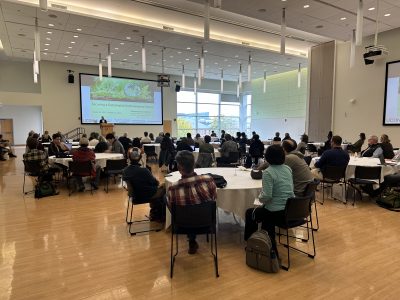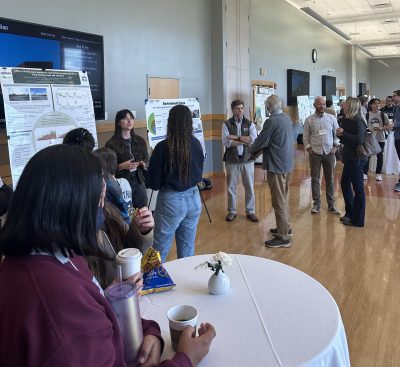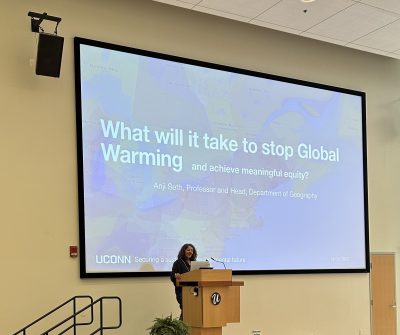Cross-college Symposium: Securing a Sustainable Environmental Future –
Summary and Video Recordings
On October 18-20, 2023, the Institute of the Environment, the College of Agriculture, Health and Natural Resources, the College of Liberal Arts and Sciences, and the College of Engineering sponsored a cross-college symposium “Securing a Sustainable Environmental Future” hosted at the University of Connecticut, Storrs campus.



The Symposium provided scholarly analysis, discussion, and debate on the topic of securing a robust environmental future. Speakers challenged the University of Connecticut community from diverse disciplines and perspectives to think critically about creative and potential solutions to environmental challenges. The Symposium addressed the severity of environmental decline, considered associated ethical issues, inequities, and tradeoffs, and formulated innovative steps toward sustainability at the University of Connecticut, local, national, and international levels.
Fred Krupp, President of the Environmental Defense Fund, provided the keynote address, and invited faculty speakers gave creative, inventive, and forward-looking talks across four thematic areas: Climate Action, Water Security, Landscape Transformation and Biodiversity, and Environmental Justice. The Symposium also featured a Panel Discussion with the CAHNR, CLAS, and CoE Deans and a poster session that showcased ongoing environmental research across the University.
Below are video recordings of the invited talks and audience discussion.
Day 1
Introduction and Keynote Address by Fred Krupp (Climate Anxiety: What actions are the antidote?)
Join Fred Krupp, President of Environmental Defense Fund, as he delivers a keynote address on “Climate Anxiety: What actions are the antidote?” Fred will grapple with tough questions facing climate advocates, including how to rapidly build a clean economy, the promise and perils of hydrogen, and the huge rewards of cutting methane pollution. He’ll also discuss how to join the fight for a better future.
Climate Action Session
Speakers:
(1) Anji Seth, Professor and Head, Department of Geography, and Chair, Atmospheric Sciences Group
Title: What will it take to stop Global Warming?
Abstract: The science of global warming is irrefutable. Humans are the driving force underlying global warming, and we have the knowledge and ability to stop it. This talk will briefly review the scale of action needed to stabilize global climate in accordance with the Paris Agreement. We will ask which solutions can address the multiple intersecting crises of climate, societal inequities, and losses of ecosystem integrity.
(2) Ugur Pasaogullari, Professor, Mechanical Engineering
Title: Our dependence on fossil fuels and what to do about it
Abstract: For the last one hundred and fifty years, fossil fuels enabled industrialization and fueled the world’s economic powers. We have also known for some time that fossil fuels are largely responsible for global warming and climate change, which we already have started experiencing the results of. In this talk, I will examine the reasons for society’s dependence on fossil fuels, namely availability, cost and dispatchability. We will also discuss current and future alternatives that provide the benefits of fossil fuels we’ve become used to, including renewables, energy storage and synthetic fuels.
(3) Juliana Barrett, Extension Educator Emerita, Connecticut Sea Grant
Title: Current and Future Needs for Climate Adaptation and Mitigation Efforts in Connecticut
Abstract: Climate change is having significant impacts on communities in Connecticut, and in many cases, these impacts are increasing in intensity with broader and more deleterious impacts. While significant research and resources are going toward adaptation and mitigation efforts and many advancements have been made, the needs of communities will continue to shift with changing impacts. With a strong understanding of current municipal and community needs, the question becomes can climate projections and feedback loops from current adaptation and mitigation efforts allow us to do more than react to future impacts?
Day 2
Land Transformation and Biodiversity Session
Part 1:
Part 2:
Speakers:
(1) Sohyun Park, Assistant Professor, Landscape Architecture
Title: Mosaic of Change: Pathways to Biodiversity in Evolving Landscapes
Abstract: This talk highlights the urgent global biodiversity crisis, evaluating our achievements and shortcomings in research and implementation to enhance biodiversity. It outlines strategies for advancing biodiversity in our environments, presenting both successful practices and untapped opportunities. Emphasizing the nexus of land transformation and biodiversity, the talk underscores the need for innovative community actions and transdisciplinary collaborations to drive collective biodiversity benefits in human-altered landscapes.
(2) Davis Chacón-Hurtado, Assistant Research Professor, Civil and Environmental Engineering and Human Rights Institute (Video not available)
Title: Infrastructure Development in the Context of Environmental Human Rights and Inter-generational Justice.
Abstract: Infrastructure development is essential for human progress and our economies. However, global warming and climate change have highlighted the need for environmentally sustainable and equitable infrastructure for future generations. This discussion explores the implications of environmental human rights for future infrastructure development. We will discuss the five principles of an “engineering for human rights” framework that promotes ethical practices for equitable communities.
(3) David L. Wagner, Professor, Ecology and Evolutionary Biology
Title: Finding ways forward for nature and humanity
Abstract: Nature’s bounty is under siege, with large animals, song birds, coral reefs, pollinators, and myriad other plants and animals known to be in decline from the poles to the equator. As the integrity of nature is eroded, global food webs will dissemble and other ecosystem services essential for humanity—water purification, soil formation, decomposition and nutrient cycling, food production, pest control, and insect pollination – will be compromised. After briefly casting about the tree of life to introduce the wonder and value of biodiversity, we will dive into the causes and consequences of both local and planetary declines, then pivot to actions that UConn’s students, faculty, and administration might embrace to promote greater biodiversity and ecosystem function locally, regionally, and abroad.
Water Security: Quantity and Quality Session
Speakers:
(1) Penny Vlahos, Professor and Associate Department Head, Marine Sciences
Title: Water resources in a changing climate
Abstract: Humanity is facing a triple threat in terms of climate, loss of biodiversity and chemical pollution and waste. These forcings impact water quality and scarcity. Through case studies we will review some of the important strategies for adaptation.
(2) Jeffrey R. McCutcheon, Centennial Professor, Chemical & Biomolecular Engineering
Title: Water Treatment in the 21st Century: Challenges and Opportunities
Abstract: This talk will summarize the past, present, and future of water treatment technologies. Particular emphasis will be placed on emerging contaminants of concern, the cost and energy needs for existing technologies, and how the academic community is succeeding (and failing) at creating solutions that will have real impact.
(3) Beth A. Lawrence, Associate Professor, Natural Resources and the Environment, and the Center for Environmental Science and Engineering
Title: Wetland restoration in the 21st century- panacea or band aid?
Abstract: Wetland restoration is increasingly prescribed as a nature-based solution to help solve some of the Anthropocene’s greatest problems– biodiversity loss, global warming, water quality degradation, and climate-change induced flooding and storm severity– yet the magnitude and effectiveness of these efforts remains unclear. Scientific interest in wetland restoration has exploded, with exponential growth in the peer-reviewed literature over the last five decades. It is less clear if wetland restoration rates on the ground are similarly growing or more importantly, the effectiveness of these efforts, largely because we lack systematic approaches to track wetland restoration implementation and outcomes at meaningful temporal and spatial scales. To advance wetland restoration and improve the delivery of services these critical ecosystems provide, we need to: 1) develop a global database on wetland restoration to allow synthesis across systems and promote predictive capacity, 2) foster strong scientist-manager communication and integrate experimentation into restoration practice to expand adaptive management, 3) integrate climate adaptation strategies to improve climate resiliency, and 4) apply proactive and earnest considerations of human dimensions.
Day 3
Enivonmental Justice Session
Speakers:
(1) Marisa Chrysochoou, Professor and Department Head, Civil and Environmental Engineering
Title: Environmental Justice in New England: what does it look like?
Abstract: Environmental Justice is an increasingly important and popular term in environmental policy. While there is a formal definition as the “fair treatment and meaningful involvement of all people regardless of race, color, national origin, or income, with respect to environmental laws and policies”, the translation of this definition to what EJ populations actually are varies greatly across the United States. The Justice40 initiative further defined “disadvantaged populations” as the target recipients for at least 40% of all federal funding within the Bipartisan Infrastructure Law and further offered a general definition for such disadvantaged populations. This talk will present an overview of definitions, policies and tools related to Environmental Justice in the US, with a focus on New England states and discuss the implications of the use of different tools and definitions to guide policy and decision making at the local level.
(2) Mayra Rodriguez Gonzalez, Assistant Extension Educator of Urban and Community Forestry
Title: Equity Unveiled
Abstract: This presentation explores the intersection between environmental justice and community engagement. We will discuss the disproportionate burden of environmental hazards faced by marginalized communities, and the critical role of community engagement in promoting equity-driven environmental management.
(3) Eleanor Shoreman-Ouimet, Assistant Professor of Environment and Human Interactions, Anthropology
Title: Upholding Humility: Reconciling environmental and ecological justice in the face of climate change-induced disasters.
Abstract: ‘Upholding Humility’ addresses the various facets of environmental justice and the debates surrounding the reconciliation of social and ecological justice in the face of climate change, social inequity, and environmental degradation. It highlights the issue of environmental injustice in the wake of climate change-induced disasters around the world and here in Connecticut to illustrate the pressing issue of inequity in disaster preparedness and response at the local level; and offers methodological approaches to support researchers in their efforts to listen to, learn from, and accompany community efforts towards resilient, just, and sustainable futures.
Capstone Address by Michael Lynch (Communicating Science in a Polarized Age) and Closing Remarks
Michael Patrick Lynch, Provost Professor of the Humanities and Board of Trustees Distinguished Professor of Philosophy
This talk is about how difficult it is to communicate scientific information in an age of denialism (e.g. the spread of Big Lies like “climate change is a hoax”). It argues that to do so effectively, we need to be aware of: (a), that not everyone spreading the idea that “climate change is a hoax” is doing so because they literally believe it – sometimes they are just committed to that idea as part of an ideology; and (b) that everything we say as experts in a polarized environment can have political meanings that are “read” differently by different sides. The paper concludes by offering some advice on how to navigate this terrain.